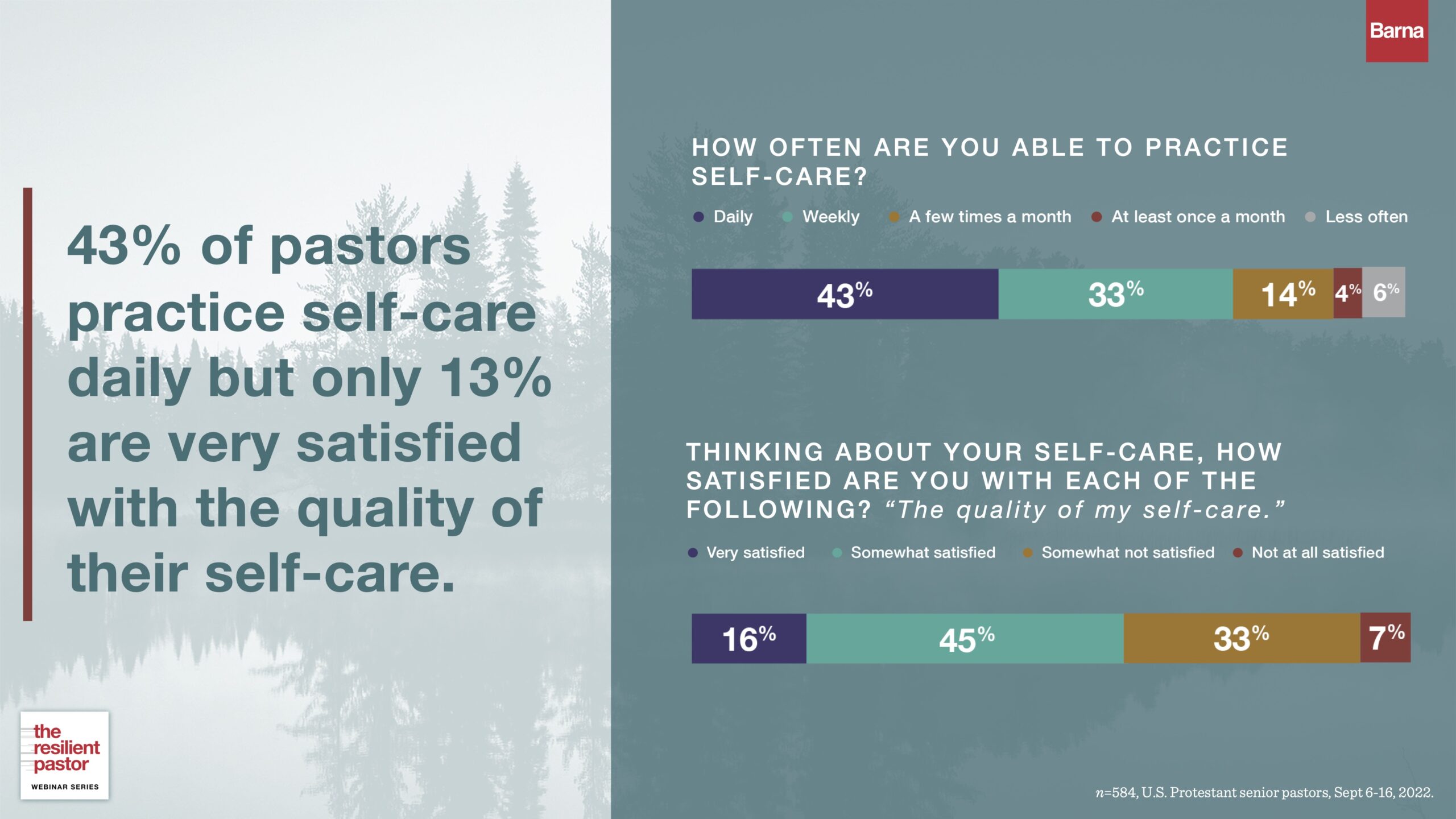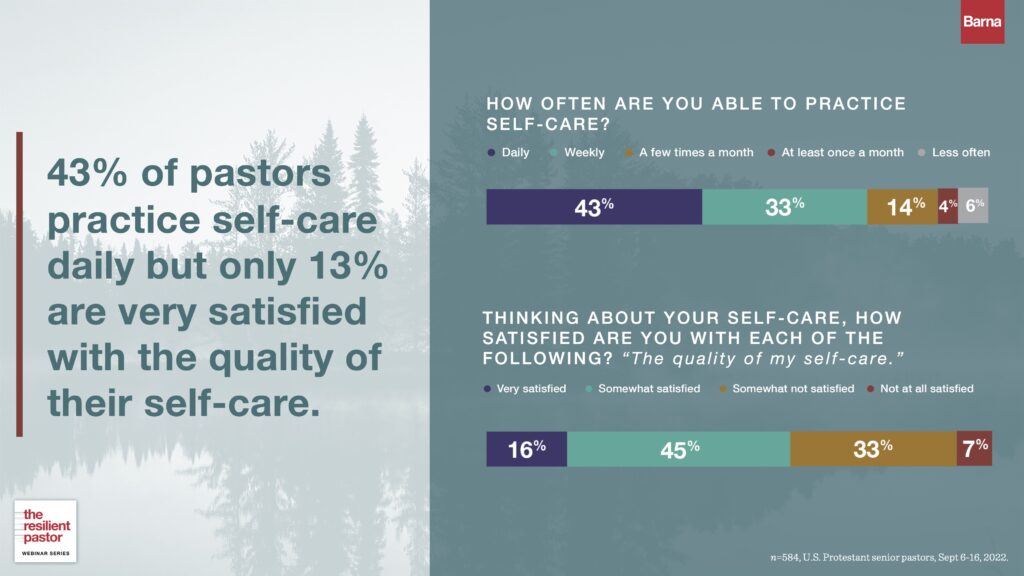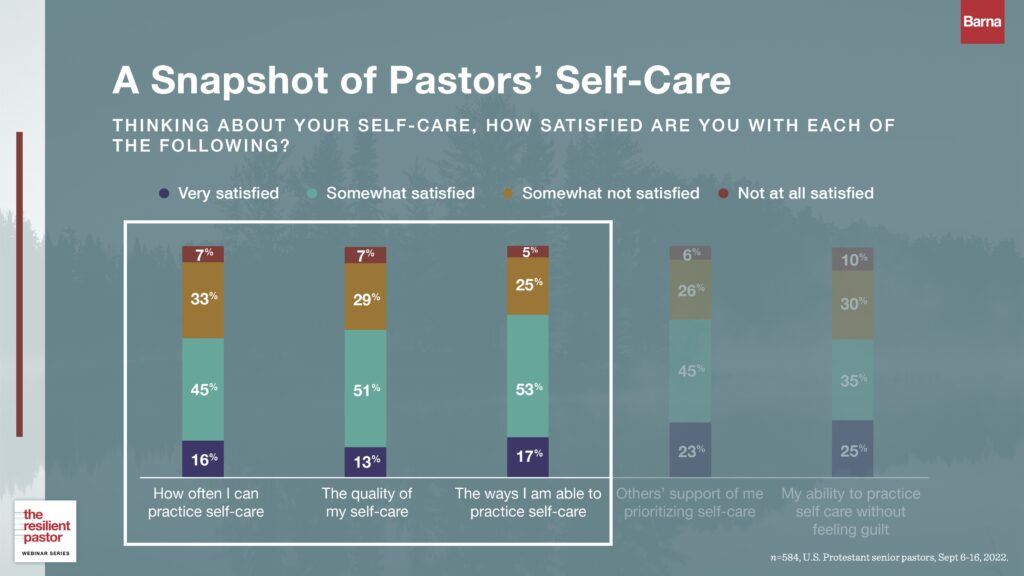
[This article is part 2 in a series where I am interacting with the latest data from Barna on Pastor’s Well-Being. You can read the first Article; Pastoral Well-Being is in Decline]
Self-care is essential for a pastor’s well-being and resilience.
You can google “pastors self-care” and get over 12 million results. It’s clear that as pastors, we need to find ways to practice healthy self-care if we are going to thrive and enjoy ministry.
According to the results of a well-being questionnaire by Barna, 43% of pastors reported practicing self-care daily, but only 13% were satisfied with the quality of their practices.

This means that even though pastors are being intentional about doing things to promote well-being and resilience, it isn’t working.
Imagine doing the same thing day after day, expecting to feel better and more resilient, only to feel like it’s not working. That would drive us crazy.
I think part of the reason pastors are struggling in this area, and the data will show, is because our self-care practices are disconnected from our life in a holistic manner.
Self-care is often practiced in isolation from the other things going on in our lives. The reality is that all of the areas of our lives (Mental, Physical, Emotional, Professional, etc) are interconnected.
When one area suffers, it affects the other parts of our lives. Those of you who are married will know that when you have had an argument with your spouse, it makes you less emotionally present to those you serve.
Every part of your life is integrated and interconnected. As such, for many, self-care practices fail because they are ways to escape the stress in our lives instead of practices that help to strengthen our inner life, which leads to resilience and better equips us to lead.
If your practices of self-care are simply helping you to escape your stress, guess what? The thing that is stressing you out will be waiting for you when you are done being distracted. I like to categorize self-care into two different categories.
Reactive Self-Care:
The first is Reactive Self-Care.
Reactive self-care is the popular way we think of self-care as the things we do for ourselves when we are stressed, overwhelmed, and anxious, among other things.
When we find ourselves struggling, we look for little escapes to put a pause on the stress. These self-care practices, like binging on a Netflix series, or going shopping, may work to give us a reprieve from the stress, but the thing that is stressing you out will wait for you. Sometimes, these little moments of escape and distraction help us pause long enough to get some perspective, but in my experience, the relief is temporary.
When you are reactive, it puts you on the defense instead of the offense.
Anytime you are on the defensive, you are already two steps back.
I suggest that better self-care practices are Proactive.
This might be why your self-care isn’t providing you the inner strength you need to persist on a high level.
Proactive Self-Care:
Proactive self-care is when you are intentional about the practices you implement in your life to help you build resilience and inner strength.
It is about laying the foundation for your life and defining your most “resilient shape”.
I am currently leading a Pastoral Resilience Cohort in which we have a working definition of resilience as a person’s “spring back into shape” form. Module 1 of the cohort equips pastors to discover and define their most resilient form or “spring back into shape.”
By doing so, when life gets stressful and overwhelming and the pastor is malformed, they have a guide to help them spring back into shape.
But you can’t know your most resilient form unless you’ve done the work of reflecting on your life and then setting intention.
Proactive self-care is being intentional in your well-being and not leaving it to chance.
If you want to discover your “spring back into shape” form, I have created a guide called “Creating a Rule of Life” that helps you lay the foundation for self-care.
A Rule of Life is how you cultivate the soil of your life to flourish in and out of season.
The word “rule” comes from the Latin regula, which means pattern or rhythm. A Rule of Life is the practices and rhythms you want to include in your daily, weekly, and monthly life that will help you cultivate the inner peace you need in order to flourish. It is not a rigid set of rules but a guide for soul health! Sign up below for your FREE guide.
Back to the results of the Barna survey.
There are six characteristics that pastors who said they were satisfied with their self-care are practicing.
These six characteristics are not necessarily self-care practices (inner life practices) but they are part of their broader ministry life (outer life competencies).
The data shows that self-care practices and a pastor’s professional life must be integrated.
These are the Six Characteristics
- Pastors with the strongest self-care align their tasks with their gifts
- Pastors with the strongest self-care prioritize building other leaders
- They allow others to regularly support them
- They have a strong influence and vision for their church
- They place a high priority on all aspects of their well-being
- Pastors with the strongest self-care even prioritize a successor
Takeaways
As you process this information, I encourage you to pay attention to how well you practice these six characteristics and where you need more help.
Get together with a peer in ministry and journey together in your growth.
Challenge each other, motivate each other, set high standards, and find new heights. If you still need help and want to process areas of growth, fill out THIS FORM and select “Free 30-Minute Coaching Call” and I will get in touch with you.
Next Steps
I have written six articles that engage with these six characteristics from a Seventh-day Adventist perspective, as that is my context.
I will be publishing these articles over the next six days.
As I engaged with each characteristic, I found that there was a lot for me to learn, and I hope they are helpful for you as well.
The one I found most engaging is number six, especially because, as Adventist pastors, we don’t have any say in our successors, but that’s what makes it even more intriguing. If you are interested in growing your resilience, sign up below to be notified of each new article as it gets published!
Slides from the Barna Survey.



David Oceguera
David has a passion to help leaders do the inner work, so that their outer lives flourish.